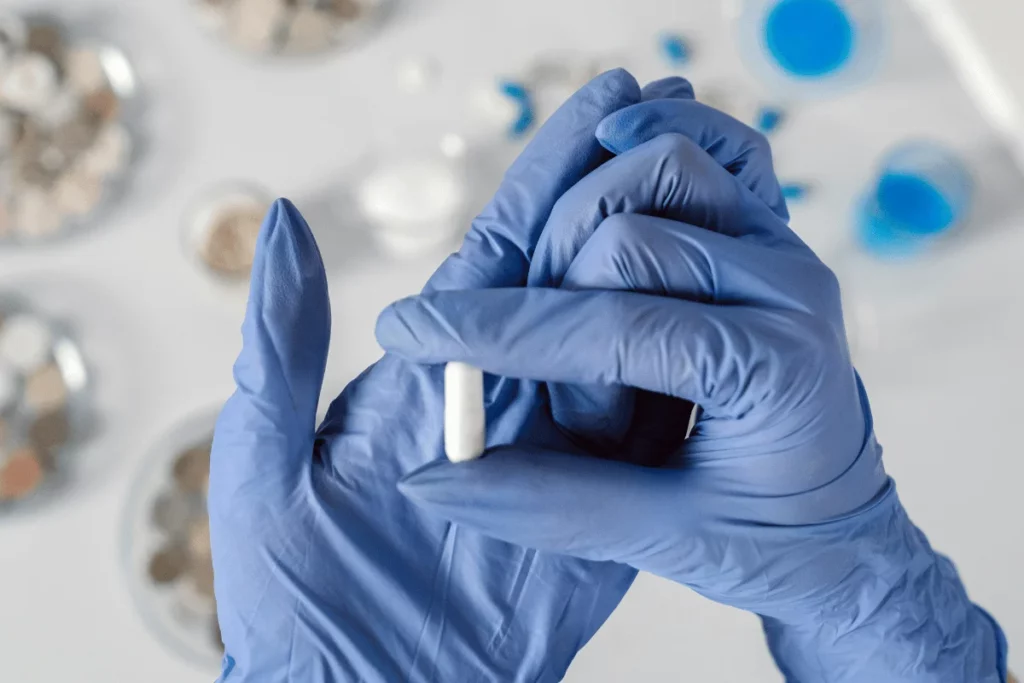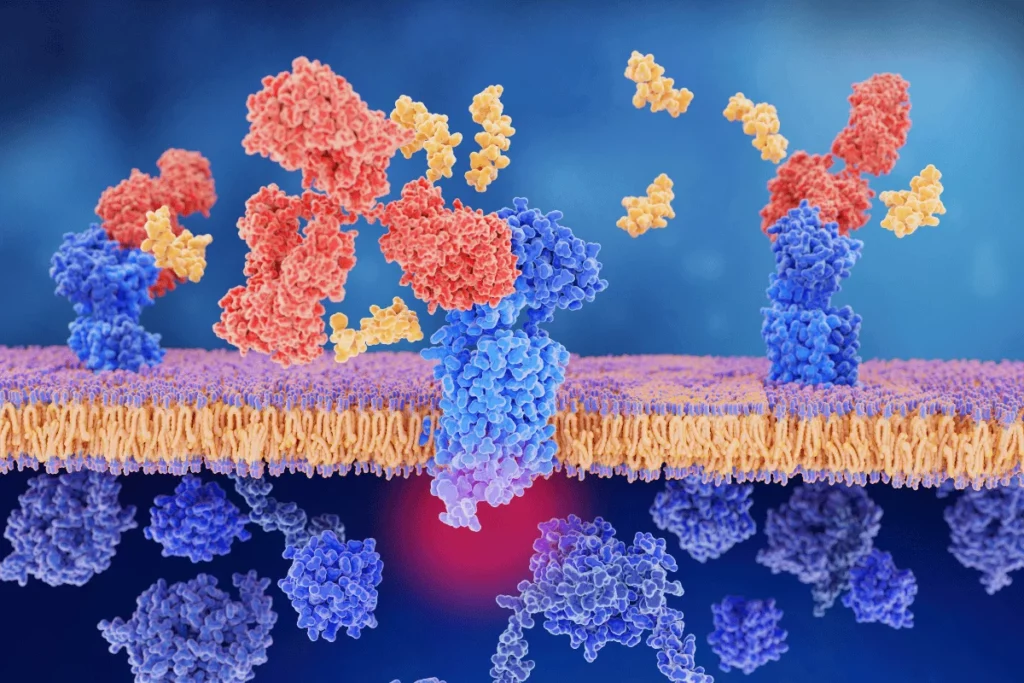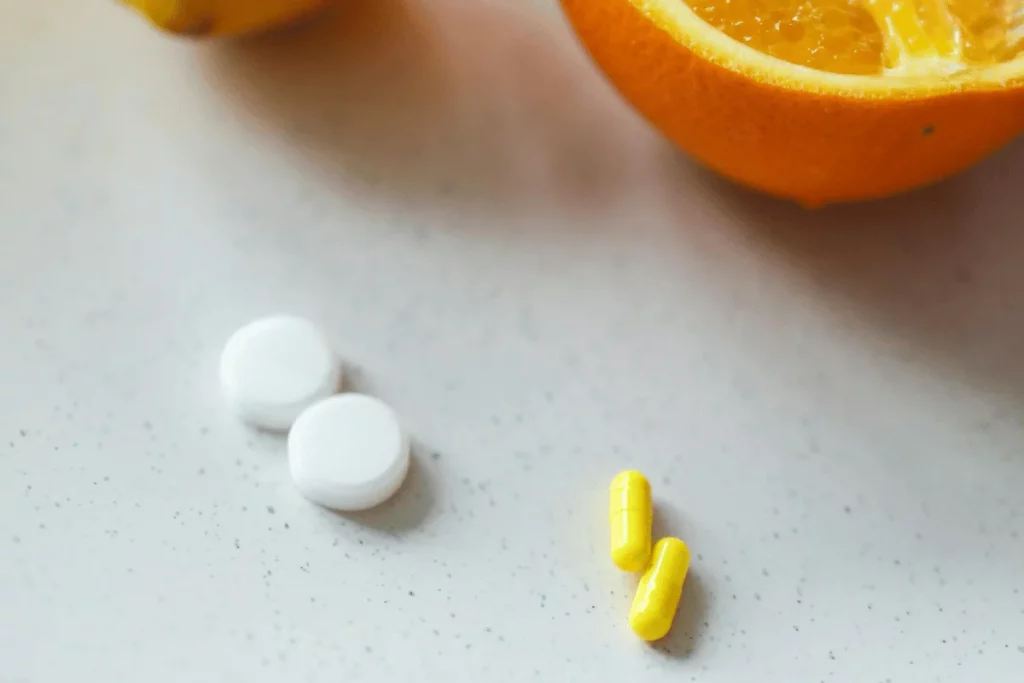[Disclaimer: This article is for informational purposes only and is not medical advice. You should consult your doctor before taking any dietary supplements like Pregnenolone to ensure suitability for your individual biology and health status.]
Why do some people seem to have endless energy and sharp memory, even as they age?
The secret might be hiding in a hormone that your own body makes – Pregnenolone.
As the master precursor to nearly all steroid hormones in your body, Pregnenolone supplementation is getting popular in the medical world for its potential brain-boosting and anti-aging effects.
But here’s the tricky part: taking the right amount is crucial. Too little might not give you any benefits, while too much could cause unwanted side effects.
In this guide, we’ll break down everything you need to know about Pregnenolone dosage, backed by science and research.
TL;DR – Optimum Pregnenolone Dosage
Here are the generally recommended Pregnenolone dosages based on current research:
- Starting Dose: 10-25 mg per day
- Standard Dose: 30-50 mg per day
- Maximum Studied Dose: Up to 500 mg daily (under medical supervision)
- Best Time to Take: Morning, with or without food
- Recommended Age: Generally 40+ years old
Keep reading for detailed guidance on finding your optimal dose based on your specific needs and circumstances.

What is Pregnenolone?
Pregnenolone is often called the “master hormone” because it is the primary building block for many other crucial hormones in your body.
Think of Pregnenolone as the raw material your body uses to create various hormones, including:
- Progesterone
- DHEA
- Testosterone
- Estrogen
- Cortisol
It’s naturally produced from cholesterol, primarily in your adrenal glands, brain, and gonads.
What makes Pregnenolone unique is that it’s found in exceptionally high concentrations in the brain – up to 5-7 times higher than in the bloodstream.
This suggests its vital role in cognitive function and neurological health.
When your body processes Pregnenolone, it converts it into a substance called Pregnenolone sulfate through a process involving an enzyme called steroid sulfotransferase.
Interestingly, your body can switch back and forth between these two forms as needed.
While Pregnenolone itself stays in your system for about 40 minutes, its sulfate form can last much longer—anywhere from 7 to 22 hours.
This difference in how long each form lasts helps your body maintain steady hormone levels throughout the day.

Health Benefits of Pregnenolone
Let’s see the science-backed benefits of Pregnenolone supplementation.
You’ll be surprised to learn how many aspects of your health this “master hormone” can influence:
Improves Schizophrenia Symptoms
The evidence for Pregnenolone’s effects on schizophrenia is most promising.
A 2019 scientific review revealed that Pregnenolone supplements could significantly improve cognitive function and daily living skills in people with schizophrenia.
Most intriguingly, research from 2018 suggests that taking Pregnenolone early on – right when someone experiences their first episode of schizophrenia – might be especially beneficial.
In clinical trials, doses ranging from 100 mg to 500 mg over eight weeks helped reduce symptoms like emotional blunting (where people have trouble expressing emotions) and improved overall functioning in daily life.
Can Reduce Chronic Pain
Got chronic back pain?
A 4-week clinical trial with 94 veterans found a promising solution with Pregnenolone.
The researchers used an escalating dosage approach:
- Participants started with 100 mg of Pregnenolone for the first week
- Increased to 300 mg for the second week
- Then, they took 500 mg for the final two weeks.
Veterans taking Pregnenolone reported significantly less back pain compared to those taking a placebo.
Even better, they found working and staying active during their daily routines easier.
This study was double-blind and placebo-controlled, meaning neither the participants nor the researchers knew who was receiving the treatment.
Notably, the participants tolerated the treatment well, even at higher doses, suggesting Pregnenolone might be a safe alternative for managing chronic pain conditions.
This is especially relevant given the current need for effective non-opioid pain management options.

Protects Brain Health and May Help Fight Alzheimer’s
Your brain naturally contains high levels of Pregnenolone; this isn’t by accident. This hormone helps protect your nervous system from inflammation.
Scientists have found interesting connections in Alzheimer’s research, where patients with this condition typically show significantly lower Pregnenolone levels.
What’s more telling is that the severity of Alzheimer’s symptoms often correlates with how low these levels are.
Helps People with Autism
A 12-week study brought hope for adults with autism spectrum disorder (ASD).
Participants taking Pregnenolone showed improvements in three key areas:
- They became less socially withdrawn
- Experienced less irritability
- Showed better sensory processing
This means that they can better handle sensory information from their environment.
Fewer Drug and Alcohol Cravings
A 2023 clinical study with 43 participants showed that taking 300 mg of Pregnenolone daily helped people with alcohol use disorder (AUD) experience fewer cravings, even in typically triggering situations.
Similar benefits were found for people dealing with cocaine addiction, where doses of 300-500 mg daily reduced both cravings and anxiety levels.

Reduces Depression Symptoms
Pregnenolone affects special proteins in your brain called MT-associated proteins (MAPs).
MAPs are like your brain’s internal scaffolding – when they’re not working properly, you’re more likely to experience major depressive disorder (MDD).
A 2017 study found that people with bipolar depression who took Pregnenolone for six weeks showed remarkable improvements in their symptoms.
Another randomized, double-blind, placebo-controlled trial of 80 adults with bipolar depression showed that 500 mg of Pregnenolone daily for 12 weeks led to significantly higher remission rates (61%) compared to placebo (37%).
The study also found that Pregnenolone was well-tolerated by participants.
Another eight-week study found similar benefits for people who had both bipolar disorder and substance abuse issues.
Additional Health Benefits
Pregnenolone’s influence extends even further. Research suggests it might help with:
- Adrenal fatigue and energy levels
- Allergic reactions and inflammation
- Mood disorders and stress management
- Multiple sclerosis and neurological conditions
- Obsessive-compulsive disorder
- Bone health (osteoporosis)
- Rheumatoid arthritis
- Type 2 diabetes
- High cholesterol
- Hypothyroidism
- Fertility issues
Pregnenolone works partly by interacting with your body’s endocannabinoid system – the same system that cannabis affects.
However, unlike THC (the compound in cannabis that gets you high), Pregnenolone provides similar benefits without any psychoactive effects.
So you get the advantages without the altered mental state.

Pregnenolone vs. DHEA – Which is Better?
Pregnenolone and DHEA are closely related.
Both hormones follow similar production patterns throughout your life:
- Pregnenolone Sulfate: Production patterns differ between sexes. In women, levels peak around age 32 and then decline continuously. In men, levels peak around age 27 and remain relatively stable throughout adulthood but decline substantially as you age. By age 75, your levels may be about 60% lower than at age 35.
- DHEA: Levels are high at birth, fall to almost undetectable levels within the first year, and rise again around age 6-8 (adrenarche), according to a comprehensive 1997 age and sex analysis. Peak levels occur between ages 20 and 30, with women peaking slightly earlier than men. After the peak, levels decline steadily, dropping to about 10-20% of peak levels by age 70-80, as confirmed by a 2013 geriatric review.
Let’s break down their key differences and help you understand which might be right for you:
| Aspect | Pregnenolone | DHEA |
| Role | Master hormone precursor (“grandmother hormone”) | Intermediate hormone (“mother hormone”) |
| Source | Synthesized from cholesterol | Converted from Pregnenolone |
| Primary Benefits | Cognitive function, mood, memory | Energy, metabolism, physical performance |
| Age to Consider | 40+ | 30+ |
| Typical Dosage | 15-500 mg/day | 25-50 mg/day |
| Main Action Sites | The adrenal cortex, brain (higher than blood levels), and gonads | Adrenal glands, peripheral tissues, testicles |
| Mechanism | Modulates GABA, NMDA, and sigma receptors | Converts to testosterone and estrogen |
| Best For | Memory, brain health, mood stability | Physical performance, hormonal balance |
Before starting either supplement, be aware of:
- Hormone Sensitivity: Both can affect hormone-sensitive conditions like certain cancers, endometriosis, and prostate issues.
- Medical Conditions: Neither should be taken if you have:
- Liver disease
- Hormone-dependent cancers
- Severe kidney problems
- Uncontrolled heart conditions
- Drug Interactions: They can interact with:
- Hormone replacement therapy
- Antidepressants
- Blood thinners
- Diabetes medications
The FDA hasn’t approved either supplement for medical use, so quality and potency can vary significantly between products.
Choose pharmaceutical-grade supplements from reputable manufacturers.

Pregnenolone and Related Hormones
As highlighted, Pregnenolone acts as the master precursor to several other important hormones:
- DHEA: Pregnenolone converts to DHEA, which then transforms into estrogen, testosterone, and other androgens.
- Progesterone: Pregnenolone makes progesterone, which is crucial for women’s menstrual cycles, fertility, bones, brain, heart, and more.
- Cortisol: Too much cortisol from chronic stress can exhaust Pregnenolone reserves over time. Optimal Pregnenolone status helps buffer against elevated cortisol.
- Allopregnanolone: This Pregnenolone metabolite positively modulates GABA receptors for anti-anxiety and sedative effects.
Restoring falling Pregnenolone levels as we age may help maintain the optimal status of several vital downstream hormones.

Pregnenolone Dosage – How to Take Pregnenolone Correctly
Now that we’ve covered the basics of what Pregnenolone is and why it matters, let’s discuss proper supplemental dosage and administration.
The discussions below are based on a summary report by the University of Maryland’s Center of Excellence in Regulatory Science and Innovation (view the full report here).
Understanding Dosage Ranges and Forms
Pregnenolone is available in several forms:
- Oral capsules and tablets (most common)
- Sublingual tablets
- Injectable suspensions (medical settings only)
The recommended dosage of Pregnenolone typically ranges from 15mg to 500mg daily.
Here are the specific recommended dosages by condition:
For US Treatments:
- Schizophrenia: 100-500mg/day (50mg tablets) for 8-14 weeks
- Bipolar Depression: 100-500mg/day (capsule form) for 12 weeks
- Mood, Cognition, and Memory Support: 15-100mg/day (15-50mg capsules) for 4-8 weeks
- Hypercholesterolemia: 15-300mg/day (capsules/tablets) for 3-9 months
- Rheumatoid Arthritis: 100-300mg/day (suspension form, intramuscular) for 7 days to 6 months
For International Studies:
- Schizophrenia: 30-500mg/day (50-100mg capsules/tablets) for 8 weeks
- Obsessive Compulsive Disorder (OCD): 400mg/day (400mg capsules) for 3 doses
The most studied concentrations are 15mg, 50mg, and 100mg formulations.
Take Pregnenolone in the morning, as it may affect sleep if taken later in the day.
Also, split larger doses throughout the day to maintain steady levels.
Monitoring and Safety Guidelines
Before starting Pregnenolone, you should get your hormone levels tested, as this is crucial for establishing your baseline levels.
The normal range for serum Pregnenolone is 22-237 ng/dL, with some experts suggesting an optimal range of 125-175 ng/dL (depending on your age).
Regular monitoring is needed because Pregnenolone can affect other hormone levels.
Common symptoms that might indicate you need dosage adjustment include:
- Fatigue
- Mood changes
- Sleep disturbances
- Changes in cognitive function.

Potential Risks and Side Effects of Pregnenolone
Pregnenolone is generally well-tolerated by most people, but you need to understand the potential risks before starting supplementation.
Since it belongs to the steroid hormone family, you might experience effects similar to other steroid medications.
Short-Term Side Effects
When you first start taking Pregnenolone, you might notice some temporary effects:
- Changes in mood (ranging from depression to euphoria)
- Mental confusion or difficulty concentrating
- Sleep disturbances, particularly insomnia
- Increased appetite
- Digestive issues, including upset stomach
- General discomfort
These effects often improve as your body adjusts to the supplement, but you should always discuss persistent symptoms with your healthcare provider.

Long-Term Concerns
If you’re considering long-term Pregnenolone use, you should be aware of potential complications that can develop over time:
Systemic Effects:
- Adrenal gland issues (your body’s natural hormone production might be affected)
- Changes in blood sugar regulation
- Increased risk of infections due to immune system changes
Physical Changes:
- Facial changes (development of a rounder face)
- Skin problems (thinning, easier bruising)
- Decreased bone density over time
- Muscle weakness
- Slower wound healing
Eye Health:
- Increased risk of cataracts
- Potential development of glaucoma
Cardiovascular:
- Possible increase in blood pressure
Always treat Pregnenolone supplementation with the same care you would any other hormone therapy.
Who Should Avoid Pregnenolone
The below group shouldn’t consider Pregnenolone at all:
- Those under 30-40 years old unless correcting an identified deficiency
- Women who are pregnant or breastfeeding
- People with hormone-sensitive cancers like prostate, uterine, ovarian, breast
- Anyone on hormone medications like birth control, estrogen, testosterone
- Those with heart conditions, liver disorders, mood disorders
When in doubt, consult your healthcare professional before taking Pregnenolone supplements – especially at higher doses.
And for anyone currently taking the hormone, monitor for side effects and adjust the dosage or discontinue use if adverse reactions manifest.
You know your body best.

Natural Alternatives to Pregnenolone
In addition to Pregnenolone supplementation, consider these natural alternatives and lifestyle changes:
- Reduce Stress: Chronic stress burdens the adrenals and burns through Pregnenolone over time. Relaxation therapies like meditation, yoga, massage, and sufficient sleep preserve Pregnenolone reserves by lowering cortisol burden.
- Eat Cholesterol-Rich Foods: Since our bodies make Pregnenolone from cholesterol, getting enough dietary cholesterol from whole eggs, shellfish, organ meats, and full-fat dairy can provide the raw material.
- Take Pregnenolone-Boosting Supplements: Vitamin E, zinc, magnesium, and adaptogens like ashwagandha and ginseng encourage the body’s own hormone synthesis pathways.
- Optimize Adrenal & Mitochondrial Function: Supporting overall adrenal gland and mitochondrial health maximizes steroidogenesis and Pregnenolone output long-term. You can consider peptides for energy enhancement that help optimize these functions.

Frequently Asked Questions (FAQs)
Let’s address some common questions about Pregnenolone supplementation:
Can Men Take Pregnenolone?
Yes, men can take Pregnenolone. It may help with:
- Energy levels (though many find the best peptide for energy to be more effective)
- Cognitive function
- Muscle mass maintenance
- Mood regulation
What Are the Pregnenolone Benefits for Women?
Women can safely take Pregnenolone to fight fatigue, depression, poor memory, arthritis, and injuries. It also helps your body produce important female hormones like estrogen and progesterone.
Combined with specific peptides for libido, it can support overall hormonal wellness.
However, women should watch for signs of increased male hormone activity (like oily skin or hair loss), as the hormone can sometimes convert into testosterone in sensitive individuals.
What Are the Pregnenolone Benefits for Men?
For men over 40, Pregnenolone may specifically help elevate lagging testosterone levels back to more youthful concentrations by supplying the upstream building blocks for steroidogenesis.
It also protects brain health, enhances cognition, balances mood, increases motivation and drive, and fights inflammation.
Conclusion
To wrap up, even though it’s a relatively new supplement, Pregnenolone could have real health benefits—especially for the brain, mood, inflammation, and hormones as one ages.
However, with any hormone, getting the dose right is necessary to safely tap those perks and avoid side effects.
This article gives you research-backed tips on dosage, how to take Pregnenolone properly, who should steer clear, and lifestyle tweaks to support your levels naturally.
As always, when trying something new, talk to your doctor first, start small, pay attention to how you feel, and tweak your approach accordingly.
The goal is to listen to your body and optimize what works for you!